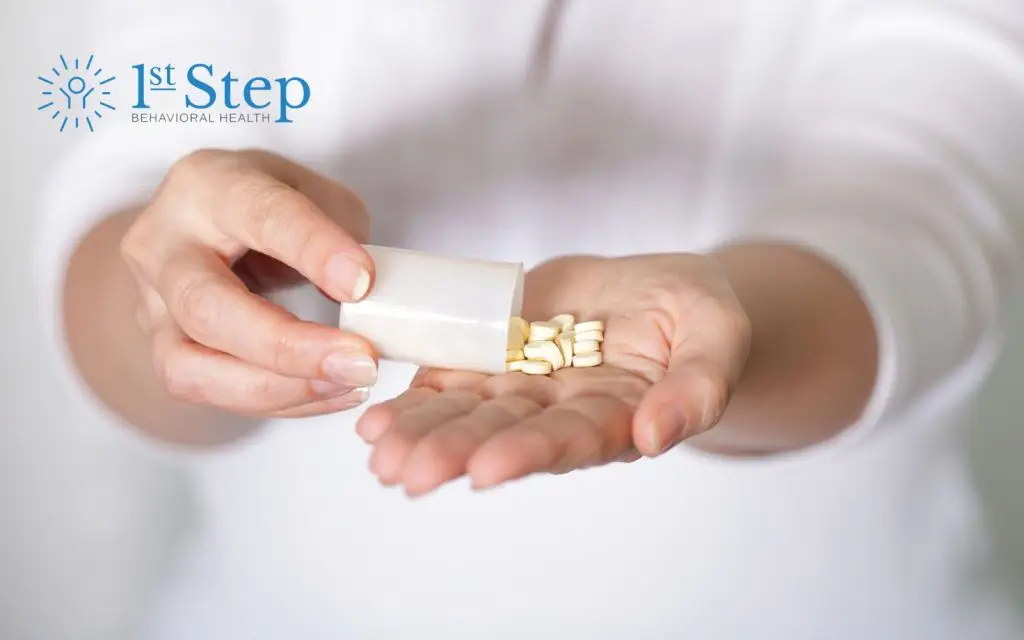Benzodiazepines are a class of medications that are prescribed to treat anxiety disorders, seizure disorders, and insomnia. Some of the most commonly used benzos include alprazolam (Xanax), clonazepam (Klonopin), and diazepam (Valium). Although benzodiazepines can be highly effective when treating a variety of health conditions, they can also be habit-forming.
Taking benzodiazepines for more than two weeks can result in physical dependence, but even people who take benzodiazepines as prescribed can develop a dependence on these drugs without becoming addicted to them. So how do you know if you are addicted to benzodiazepines or not?
Addiction is a disease characterized not only by physical dependence but also by compulsive or obsessive behaviors and dangerous patterns surrounding one’s drug use. If you or a loved one are struggling with benzodiazepine addiction, a rehab center like First Step Behavioral Health can help you achieve sobriety.
Here are 5 signs you need treatment for benzodiazepine addiction.
1. You aren’t prescribed benzos, but you have symptoms of withdrawal if you stop taking them.
Benzodiazepines are mostly used for a short period (less than two weeks). However, some people need to take benzos for longer periods, so they will become physically dependent. These individuals still take their medication as prescribed, though. They can also taper off benzos with the help of their doctor when they are ready. In a case such as this where a person is taking their medication as directed, addiction isn’t present.
If you are not prescribed benzos by your doctor, or you use them more frequently than you are supposed to, you may develop a physical dependence, resulting in symptoms of withdrawal if you suddenly stop taking them.
Benzodiazepine withdrawal can range in severity from mild to severe and life-threatening. Common withdrawal symptoms include anxiety, agitation, generalized discomfort, insomnia, tremors, seizures, hallucinations, and delusions. Stopping benzodiazepines cold turkey after long-term use is extremely dangerous without medical supervision.
2. You experience intense drug cravings and feel as though you can’t function without benzodiazepines.
Another sign that you need treatment for benzodiazepine addiction is a mental obsession. If you are addicted, you may experience frequent drug cravings or intense desires that make you want to get high. You may also feel as though you simply cannot function without benzos, and that taking them every day is a necessity.
In addition to cravings, you may begin to rationalize your drug use, or deny that your benzo addiction is as serious as it really is. Rationalization and denial are part of the mental obsession that comes with addiction. This mental obsession is extremely difficult to break without professional treatment.
3. You have made multiple failed attempts to stop abusing benzodiazepine drugs.
There is a difference between drug abuse and drug addiction. People who abuse drugs may be trying to get high, but if they aren’t addicted they can stop using drugs when they need to, such as for work or for a court hearing.
However, if you are addicted, you are unable to control your drug use. You may want to get sober, and you may even try over and over again to stop taking benzos, only to find yourself giving in to the intense cravings and withdrawal symptoms that you experience.
Loss of control over your benzodiazepine use combined with multiple failed attempts at sobriety is a tell-tale sign that you need to seek professional help.
4. Your interests and behaviors are changing–and your family is concerned.
Benzodiazepine addiction changes the way you think, feel, and behave. It can change what is important to you, as your drug use will slowly become more and more important than everything else in your life.
As benzos take top priority, other things that you once enjoyed, such as your hobbies, may slip to the wayside. You may stop engaging in your hobbies or participating in activities that you used to love. You may also find it difficult to maintain your responsibilities in regard to work, school, or family.
When your behaviors, interests, and priorities shift, your family and loved ones are bound to notice. They may even become concerned.
Oftentimes, family and friends are the first ones to realize when someone has a drug problem. If your family and friends are concerned about you, it is another sign that you need treatment for benzodiazepine addiction.
5. You spend excess time and money on buying benzos, getting high on them, and recovering from their effects.
When getting high becomes your top priority, you will spend less time doing things you used to enjoy, and more time on your addiction. You may find yourself spending a lot of time buying benzos, using them, and recovering from their effects.
You may also begin experiencing financial problems as more and more of your money goes toward buying pills.
Find Treatment for Benzodiazepine Addiction in Florida Today
Benzodiazepine addiction treatment involves medically-supported detox, behavioral therapy and counseling, and long-term aftercare. You should never stop taking benzodiazepines suddenly unless you do so under medical supervision. A benzodiazepine detox and rehab center in Florida can help you start your recovery safely with compassionate support.
If you or a loved one struggles with a benzodiazepine use disorder, it’s time to seek help before it’s too late. Call now to speak with a team member about starting treatment.
Jump to a Section
Call (855) 425-4846
